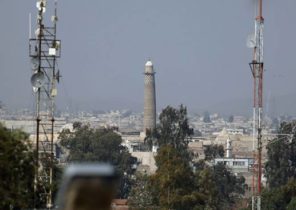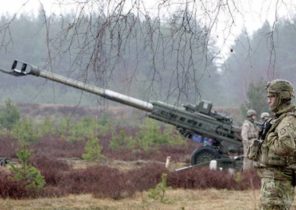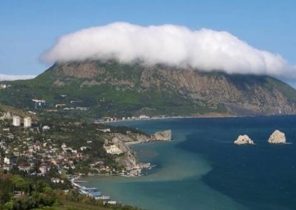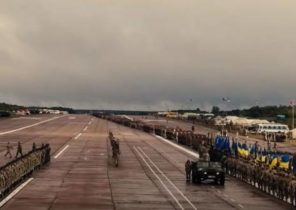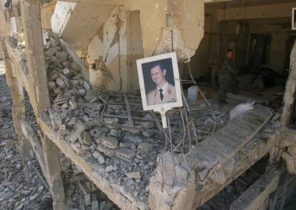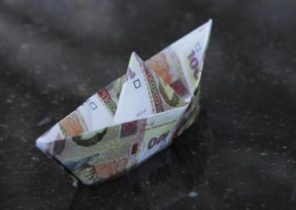
In this village, located on the front line between the separatists and government forces since 29 January fighting resumed. The cease-fire remained a distant memory. The mood of the locals fluctuate between humility, hope, and anger.
Small stone outbuildings Victor Ilyich, miner retired, asks Alyosha to come. Through a narrow embrasure in the wall he is looking through binoculars at snow-covered hill in front of: “See, here’s the dill,” he says to his friend from Donetsk, who brought him some necessities. About 400 metres from this part of the village zaytsevo really flying the flag of the garrison of Ukrainian soldiers. The other part of the village is behind the hill on the territory controlled by Kiev. For two years Victor and his wife live near new neighbors — these, which was on the hill and those that camped out outside the village, armed soldiers of the self-proclaimed Donetsk national Republic (DND).
The pair continues to carry on their shoulders the heavy burden of the war, which began in 2014 and has claimed about 10 million lives, of which more than a dozen in the last week. From January 29, while the major powers — Russia, Europe and the USA were at odds after the election Donald trump, between Ukrainian forces and DPR (self-proclaimed Donetsk people’s Republic was founded in 2014, when the Eastern regions of the country opposed the dismissal of President Viktor Yanukovych, after he did not go to the signing of the Association Agreement between Ukraine and the European Union, which led to protests on the Maidan in Kiev — approx. ed.) resumed intense fighting. Kiev and Moscow accuse each other of responsibility for this new escalation of tensions. Signed on Christmas day (Catholic Christmas approx. ed.) the agreement about the cease-fire did not last long. As for the Minsk agreement, signed two years ago, February 12 2015 between Russia, Ukraine, Germany and France with the aim to find a peaceful solution to the conflict, there was more nobody believes them. Exchange of prisoners took place, but local elections were not organized, which makes impossible the transfer of the Kiev authorities control over the border, as envisaged in the agreements.
“Here we are at home and don’t want to leave!”
Despite the constant feeling of anxiety, two pensioners have decided not to give up. “Merrily we live here, right?”, — with a sarcastic smirk, asks Viktor, standing on the porch of his home. This house, like most of the other buildings on this village street, with 2015 it became a target for regular attacks, which are conducted from the hill. Outside on the walls of the house are visible traces of bullets. Inside, the house was also injured. “Well, where will you go? Here we are at home and don’t want to go!”, says the old man.
In one of the rooms Irina shows the trajectory of the bullet that went through a window and got in the closet. Another one stuck in the living room wall where hangs an icon of the virgin and child. “Snipers have fun with us!”, — assures the former worker of a textile factory in Gorlovka. Bending over the bowl of potatoes, a 60 year old woman looks into the void: “Today there is no turning back, too many dead… too much injustice. We all pay taxes to the Ukrainian government that not only doesn’t pay our pensions, but was still shooting at us! How this people make peace?” — outraged Irina. Sitting by the stove and placing in the furnace just splitted the wood, Victor continues: “I hope that we will get independence, or that we will join Russia! With Ukraine it’s all over! Last time I got my miner’s pension in the first quarter of 2016. Since Kiev never sent me one! This is DND to me every month pays a small pension is 3,200 rubles.” After a hearty soup to an elderly couple decides to show us the house of his son, went to the front. On Monday the village was again opened mortar fire, including the center. To get hit by a stray bullet easily. “People are constantly getting injured. Last summer I had bone in the arm,” says Irina, showing her palm.
Victor, he and Irina are on the icy street leading to the village. The surrounding is a ringing silence. Temperatures range from minus 15 to minus 20. Track past them, passing military vehicle. “This is a humanitarian assistance — Republic of provides home oil for generators,” explains Alesha. Between two houses, where the street is not protected by a wall and goes straight to the hill, retired almost imperceptibly lowered his head and speed up a step. The green gate, riddled with bullets, Irina opens the door of the house with a broken roof, covered with blue-white tarpaulin high Commissioner for refugees of the United Nations. “Just a few months ago lived here our son,” says an elderly woman. From the roof flows a strong stream of water, falling on the floor and seeping through the musty walls. Abandoned furniture is gradually rotting. The humidity squeezes my throat.
Down the road you can see the shell stuck in the wall. He’s only been here a couple of hours or days and still shines, unlike the rusted shell casings, shrapnel and fragments of shells scattered along the road. A little further shows another building, almost entirely destroyed. “This is what remains of the house my daughter Tatiana,” laments Irina. “They lived here for the last week with 3 year old granddaughter Rita and her husband Valery. But for three days the house was fired twice. The first time they were inside. Fortunately, that is not the second”. Tatiana, Rita and Valeria moved to Gorlovka, a large neighboring city, where entire neighborhoods were heavily bombarded for the past two years, as well as chemical complex, one of the largest in the former USSR. Alesha, a friend of the family, wanted to make Rita a surprise. But Valeri, the father, is not satisfied: “Why must we get? Everybody always want to talk to my daughter. From television and journalists no good. They are not telling the truth about what is happening,” he complains.
More and more men and women join rebels
Valery just because the table at which were gathered his wife, his two daughters and their friend. The latter tries to smooth out the atmosphere. “You also understand what we go through… My husband was killed last year. He began to fight in the army of the militias, because work was no more. I’m a nurse, and on one of his salary I have to have children. You should understand our anger. Kiev wants to destroy us. Why?” Today, unemployment in the mines, for metals and major chemical plants caused by the destruction of industrial facilities in the region, pushing more and more men and women to join the rebels. “My husband, Alex and Valery just one of these,” continued the young woman, ending another pack of cigarettes. It interrupts the sounds ringtone — mobile calls. Valery picks up the phone lying on the windowsill. His Burgundy face suddenly white. “I have to go, he says in a half whisper. In Debaltsevo shoot again”. Debaltseve is one of the strategic places in the war. Exactly two years ago here was one of the most brutal battles.
Stefan Obear, special correspondent in zaitsiv and Gorlovka (the separatist regions of Ukraine). Translation: the Society of friends of L’humanité.
